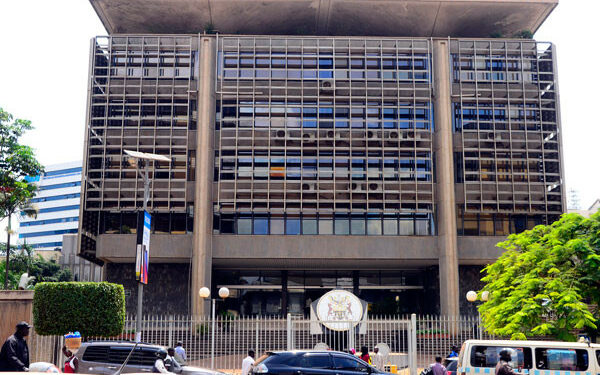Uganda’s fiscal landscape is undergoing a seismic shift as the Treasury embarks on securing a substantial Ush3.5 trillion ($919.5 million) loan from commercial banks to bolster the supplementary budget. This strategic move is poised to unleash a short-term ripple effect, with an anticipated surge of approximately two percent in interest rates on treasury bonds. However, the decision is not without its challenges, as the nation grapples with constrained social service delivery, lackluster tax revenue collections, and a cautious growth forecast.
The colossal sum is earmarked for a spectrum of critical initiatives, including diverse infrastructure projects and contingency expenditures associated with state house and security agencies. Notably eclipsing the Ush2.5 trillion ($656.8 million) loan secured from Stanbic Bank Uganda in 2020, which primarily served to cover salaries during the Covid-19 lockdown, this financial package underscores Uganda’s commitment to addressing multifaceted economic demands.
As the fiscal year 2023/24 unfolds, Uganda finds itself navigating turbulent waters marked by poor tax revenue performance, sluggish business activity, and a vulnerable exchange rate. Tax revenue collections fell short by a staggering Ush600 billion ($157.6 million) between July and November 2023, and projections suggest a looming Ush1 trillion ($262.7 million) deficit by June 2024. In response to this fiscal predicament, the Finance ministry dispatched a missive to the Uganda Revenue Authority commissioner-general on December 7, 2023, urgently seeking administrative interventions to rectify these revenue shortfalls.
The pressing need for these financial injections becomes evident against the backdrop of the Uganda shilling’s significant depreciation against the dollar from September to November 2023. The currency faced headwinds from substantial dividend payments by foreign multinationals and the backdrop of rising policy interest rates in developed economies. Bank of Uganda (BoU) data meticulously outlines the shilling’s journey, closing at Ush3,757 in September, Ush3,781 in October, and Ush3,817 in November.
As Uganda grapples with these economic intricacies, it becomes imperative to dissect the various facets of this financial development and its potential ramifications. The decision to secure a Ush3.5 trillion loan signifies a bold step towards addressing the pressing needs of the nation, particularly in the realm of infrastructure and security. However, the expected short-term surge in interest rates on treasury bonds introduces an element of financial complexity that necessitates a closer examination.
At the heart of this financial maneuver is the allocation of funds to diverse infrastructure projects. These projects, crucial for the nation’s development, span sectors such as transportation, energy, and communication. The injection of funds into these initiatives has the potential to stimulate economic growth, create employment opportunities, and enhance overall productivity. However, the magnitude of this financial commitment raises questions about the government’s long-term fiscal strategy and its capacity to manage the resulting debt.
The supplementary budget’s association with state house and security agencies further underscores the government’s prioritization of critical sectors. The need for enhanced security and efficient governance is evident, especially in the face of evolving geopolitical challenges. Nevertheless, the allocation of substantial financial resources to these areas prompts a scrutiny of the overall budgetary allocation strategy and the potential impact on other essential services.
Comparing this current financial move to the Ush2.5 trillion loan secured in 2020 provides context to the evolving economic landscape. The 2020 loan, obtained during the Covid-19 lockdown, primarily aimed to alleviate the financial burden of paying salaries to public employees. In contrast, the current Ush3.5 trillion loan is oriented towards broader economic development and infrastructure enhancement. This shift in focus signals the government’s strategic pivot from crisis management to long-term economic planning.
The fiscal challenges faced by Uganda in the current financial year, such as poor tax revenue performance and sluggish business activity, underscore the complexities of economic management. The projected Ush1 trillion deficit by June 2024 poses a critical threat to the government’s financial stability and its ability to deliver essential services. The Finance ministry’s urgent plea for administrative interventions from the Uganda Revenue Authority highlights the need for swift and effective measures to bridge the revenue gap and mitigate the potential adverse effects on service delivery.
The vulnerability of the Uganda shilling against the dollar adds another layer of complexity to the economic landscape. The depreciation observed between September and November 2023 is attributed to external factors, including significant dividend payments by foreign multinationals and the influence of rising policy interest rates in developed economies. This external pressure on the exchange rate underscores the interconnectedness of the global economic ecosystem and the challenges faced by emerging markets like Uganda.
In conclusion, Uganda’s pursuit of a Ush3.5 trillion loan marks a pivotal moment in the nation’s economic trajectory. While the infusion of funds into critical sectors promises potential benefits for infrastructure development and national security, the associated challenges, including a short-term surge in interest rates on treasury bonds, demand careful consideration. As Uganda navigates the intricate web of economic intricacies, effective fiscal management, strategic planning, and targeted interventions will be crucial in ensuring the nation’s financial resilience and sustainable development.
Source: The East African



















Leave a Reply